新人教八年级下英语1—5单元知识点总结
八下1-5单元重点及考点总结
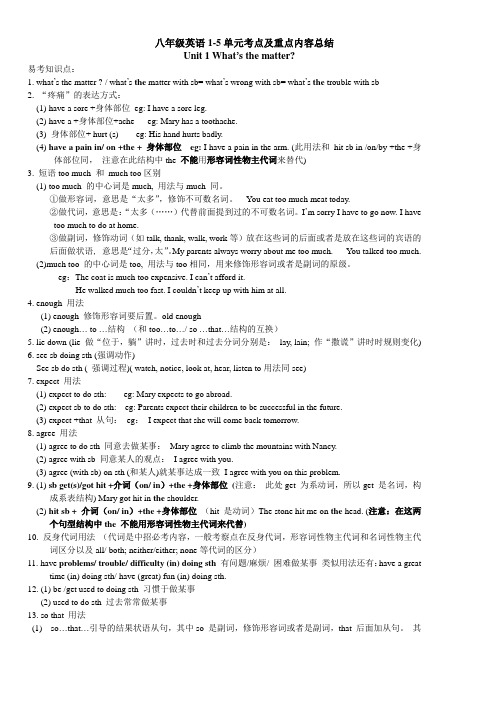
八年级英语1-5单元考点及重点内容总结Unit 1 What’s the matter?易考知识点:1. what’s the matter ? / what’s the matter with sb= what’s wrong with sb= what’s the trouble with sb2. “疼痛”的表达方式:(1) have a sore +身体部位eg: I have a sore leg.(2) have a +身体部位+ache eg: Mary has a toothache.(3) 身体部位+ hurt (s) eg: His hand hurts badly.(4) have a pain in/ on +the + 身体部位eg: I have a pain in the arm. (此用法和hit sb in /on/by +the +身体部位同,注意在此结构中the 不能用形容词性物主代词来替代)3. 短语too much 和much too区别(1) too much 的中心词是much, 用法与much 同。
①做形容词,意思是“太多”,修饰不可数名词。
You eat too much meat today.②做代词,意思是:“太多(……)代替前面提到过的不可数名词。
I’m sorry I have to go now. I havetoo much to do at home.③做副词,修饰动词(如talk, thank, walk, work等)放在这些词的后面或者是放在这些词的宾语的后面做状语, 意思是“过分,太”。
My parents always worry about me too much. You talked too much.(2)much too 的中心词是too, 用法与too相同,用来修饰形容词或者是副词的原级。
eg:The coat is much too expensive. I can’t afford it.He walked much too fast. I couldn’t keep up with him at all.4. enough 用法(1) enough 修饰形容词要后置。
新人教版|八年级下册英语所有知识点大汇总
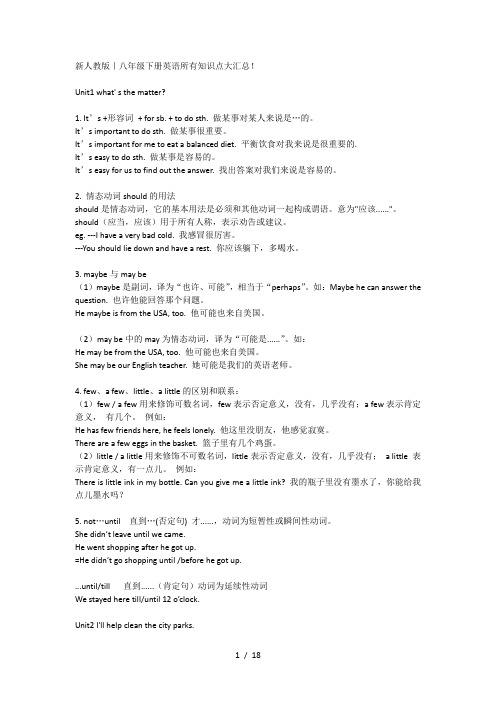
新人教版|八年级下册英语所有知识点大汇总!Unit1 what' s the matter?1. It’s +形容词+ for sb. + to do sth. 做某事对某人来说是…的。
It’s important to do sth. 做某事很重要。
It’s important for me to eat a balanced diet. 平衡饮食对我来说是很重要的.It’s easy to do sth. 做某事是容易的。
It’s easy for us to find out the answer. 找出答案对我们来说是容易的。
2. 情态动词should的用法should是情态动词,它的基本用法是必须和其他动词一起构成谓语。
意为"应该......"。
should(应当,应该)用于所有人称,表示劝告或建议。
eg. ---I have a very bad cold. 我感冒很厉害。
---You should lie down and have a rest. 你应该躺下,多喝水。
3. maybe与may be(1)maybe是副词,译为“也许、可能”,相当于“perhaps”。
如:Maybe he can answer the question. 也许他能回答那个问题。
He maybe is from the USA, too. 他可能也来自美国。
(2)may be中的may为情态动词,译为“可能是......”。
如:He may be from the USA, too. 他可能也来自美国。
She may be our English teacher. 她可能是我们的英语老师。
4. few、a few、little、a little的区别和联系:(1)few / a few用来修饰可数名词,few表示否定意义,没有,几乎没有;a few表示肯定意义,有几个。
例如:He has few friends here, he feels lonely. 他这里没朋友,他感觉寂寞。
最新人教版八年级下册英语-Unit1-5-单元笔记+练习

最新人教版八年级下册英语-Unit1-5-单元笔记+练习八年级下册Unit 1 单元笔记1. People will have robots in their homes. 人们家里将会有机器人。
will助动词,表单纯的未来。
用于陈述句表“将……,会……”。
e.g. I will (I'll) be 15 next month.下个月我就15岁了。
Mr. Green will be back soon.否定句:won't = will not eg. He won't be back before 10.will用于疑问句意为“会……吗?”e.g. Will you be free on Friday evening?Will people have robots?2. There will only be one country.将会只有一个国家。
There will be 是there be句型的将来时。
e.g. There won't be any paper money. (否定)Will there be less pollution? (疑问)Yes, there will./ No, there won't.There will be more people. (肯定) ※常见错误:there will have…3. I think there will be more / less pollution. 我认为将会有更多/更少的污染。
fewer 与less及more表数量的用法。
(1)few(形容词)“几乎没有,很少的”,修饰可数名词。
其比较级、最高级为规则变化:few-fewer-fewest。
“a few”表示“一些”,“few”带否定含义,“几乎没有”。
例:a few days ago, for a few weeks,He has few friends here. There will be fewer trees.(2)little(形容词)“很少的,几乎没有的”(“小的,幼小的”),修饰不可数名词。
最新人教版八年级英语下册第一单元知识点汇总

最新人教版八年级英语下册第一单元知识点汇总Unit 1 What’s the matter?一、基础知识1.我感冒了。
可以表达为I had a cold、catch a cold或have the flu。
have a fever表示发烧,have a cough表示咳嗽,have a stomachache或肚子疼表示胃疼,have a toothache表示牙疼,have a headache表示头疼。
2.将身体部位和ache(疼痛)结合起来构成新的复合词,如stomach+ache=stomachache,head+ache=headache,tooth+ache=toothache,back+ache=backache,表示相应的疼痛。
3.“怎么啦?出什么事情了?”可以表达为What’ s the matter。
也可以用What’ s the trouble with you?或What’ s wrong with you。
matter和trouble为名词,其前可加the或形容词性物主代词,而wrong是形容词不能加the。
用于询问某人有什么病或遇到什么麻烦、问题,其后跟询问对象时,与介词with连用,如What’s the matter with sb。
= What’s your trouble?= What’s up?= What happens to sb。
举例来说,当问到“What’s the matter with you?”时,回答可以是“I have a bad cold.”4.maybe表示“或许”,常用于句首,表示可能性,后加句子。
例如Maybe you are right。
may be是情态动词+be的结构,意为“可能,也许”,后加名词、代词或形容词。
例如He maybe angry。
sound like可以和名词、代词以及从句结合使用,如It sounds like you don’t know the truth.It sounds like a good idea。
人教版八年级英语下册1-5单元知识点归纳
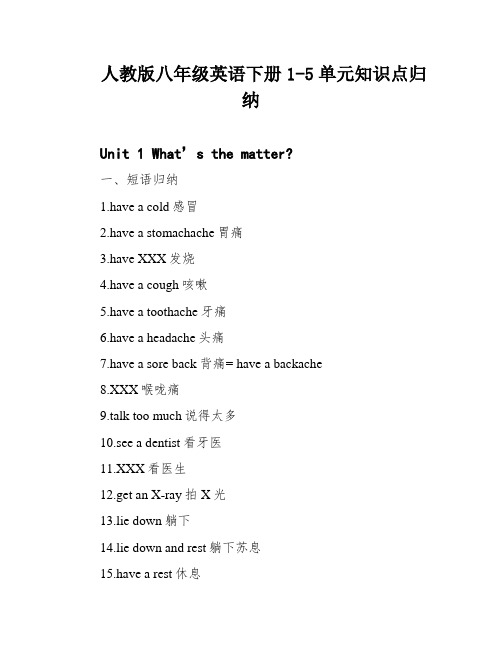
人教版八年级英语下册1-5单元知识点归纳Unit 1 What’s the matter?一、短语归纳1.have a cold感冒2.have a stomachache胃痛3.have XXX发烧4.have a cough咳嗽5.have a toothache牙痛6.have a headache头痛7.have a sore back背痛= have a backache8.XXX喉咙痛9.talk too much说得太多10.see a dentist看牙医11.XXX看医生12.get an X-ray拍X光13.lie down躺下14.lie down and rest躺下苏息15.have a rest休息16.take a break休息=take breaks17.take your temperature量你的体温18.XXX伤到她自己19.cut myself切到我自己20.cut off切除cut down砍到cut up切断可编辑范本cut out删除21.get off下车22.make a XXX做决定23.to my surprise令我惊讶的是24.on the weekend在周末=on weekends25.in the same way以相同的方式26.without XXX毫不犹豫27.thanks to多亏thanks for因…而感谢(+名词/动词ing)28.in time实时on time按时29.save a life挽救生命30.get into trouble堕入贫苦31.right away立时32.fall down跌倒33.wait for等待XXX对做某事感兴趣35.give up放弃二、用法集萃1.询问有什么病或有什么麻烦:What’s the matter (with sb.)?2.疾病的表达:have/has a+疾病名称3.太多:too much +不成数名词;too many +可数名词复数方式太:much too +描述词4.XXX足够的:①形容词+enough②enough +名词③it is XXX.可编辑范本5.XXX躺下过去式:lay现在分词:lying6.XXX.看见某人正在做某事(正在进行)XXX.看见某人做了某事(看见动作的全过程)7.XXX.期望做某事8.need to do sth.需求做某事9.help sb。
人教版英语八年级下册Unit 1-5 单元语法知识梳理
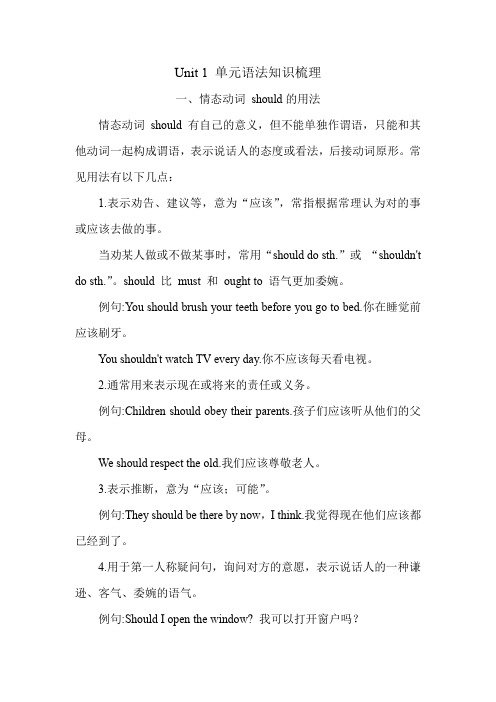
Unit 1 单元语法知识梳理一、情态动词should的用法情态动词should有自己的意义,但不能单独作谓语,只能和其他动词一起构成谓语,表示说话人的态度或看法,后接动词原形。
常见用法有以下几点:1.表示劝告、建议等,意为“应该”,常指根据常理认为对的事或应该去做的事。
当劝某人做或不做某事时,常用“should do sth.”或“shouldn't do sth.”。
should 比must 和ought to 语气更加委婉。
例句:You should brush your teeth before you go to bed.你在睡觉前应该刷牙。
You shouldn't watch TV every day.你不应该每天看电视。
2.通常用来表示现在或将来的责任或义务。
例句:Children should obey their parents.孩子们应该听从他们的父母。
We should respect the old.我们应该尊敬老人。
3.表示推断,意为“应该;可能”。
例句:They should be there by now,I think.我觉得现在他们应该都已经到了。
4.用于第一人称疑问句,询问对方的意愿,表示说话人的一种谦逊、客气、委婉的语气。
例句:Should I open the window? 我可以打开窗户吗?What should we do now? 我们现在该干什么呢?5.表示某种感情色彩,意为“竟会”,常用于以how, why开头引导的特殊疑问句中。
例句:Why should you be so early today? 你今天为什么会如此早?二、反身代词1.反身代词的构成反身代词是一种表示反射或强调的代词。
它由第一人称、第二人称的形容词性物主代词和第三人称代词的宾格加词尾-self或-selves构成。
其构成如下表:反身代词与它所指代的名词或代词形成互指关系,两者在人称和数上应保持一致。
人教版八年级英语下册1-5单元知识点归纳教学内容
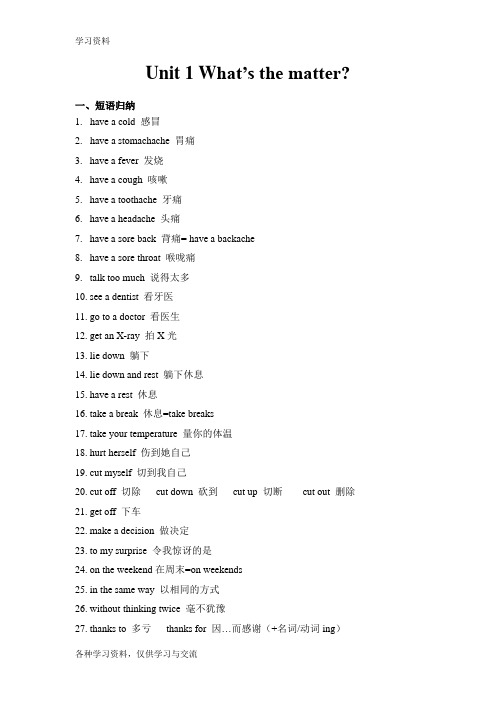
Unit 1 W hat’s the matter?一、短语归纳1.have a cold 感冒2.have a stomachache 胃痛3.have a fever 发烧4.have a cough 咳嗽5.have a toothache 牙痛6.have a headache 头痛7.have a sore back 背痛= have a backache8.have a sore throat 喉咙痛9.talk too much 说得太多10.see a dentist 看牙医11.go to a doctor 看医生12.get an X-ray 拍X光13.lie down 躺下14.lie down and rest 躺下休息15.have a rest 休息16.take a break 休息=take breaks17.take your temperature 量你的体温18.hurt herself 伤到她自己19.cut myself 切到我自己20.cut off 切除cut down 砍到cut up 切断cut out 删除21.get off 下车22.make a decision 做决定23.to my surprise 令我惊讶的是24.on the weekend在周末=on weekends25.in the same way 以相同的方式26.without thinking twice 毫不犹豫27.thanks to 多亏thanks for 因…而感谢(+名词/动词ing)28.in time 及时on time 按时29.save a life 挽救生命30.get into trouble 陷入麻烦31.right away 马上32.fall down 跌倒33.wait for 等待34.be interested in doing sth. 对做某事感兴趣35.give up 放弃二、用法集萃1.询问有什么病或有什么麻烦:What’ s the matter (with sb.)?2.疾病的表达:have/has a+疾病名称3.太多:too much +不可数名词;too many + 可数名词复数形式太:much too +形容词4.enough 足够的:①形容词+enough ②enough +名词③it is enough +to do sth.5.lie 躺下过去式:lay 现在分词:lying6.see sb. doing sth. 看见某人正在做某事(正在进行)see sb. do sth. 看见某人做了某事(看见动作的全过程)7.expect to do sth. 期望做某事8.need to do sth. 需要做某事9.help sb. ( to ) do sth. 帮助某人做某事10.tell sb. ( not ) to do sth. 告诉某人(不要)做某事11.ask sb. to do sth. 要求某人做某事12.want to do sth. 想要做某事13.agree to do sth.同意做某事disagree to do sth. 不同意做某事agree with sb. 同意某人的意见14.trouble问题;麻烦have trouble/problem doing sth. 做某事有困难15.介词+doing 常见的介词有:at; for; with; without; in about16.be/ get used to doing sth. 习惯于做某事17.keep on doing sth. 继续做某事18.mind doing tsh. 介意做某事19.反身代词:myself 我自己yourself 你自己himself 他自己herself 她自己itself 它自己复数:ourselves 我们自己yourselves 你们自己themselves 他们自己20.knife-knives 刀名词复数规则变化:①一般情况+s②以e结尾+s③以s、x、ch、sh结尾+es④以辅音字母+y结尾,变y为i+es⑤以o结尾,有生命+es; 无生命+s⑥以f/fe结尾,变f/fe为v+es不规则变化:foot-feet脚、足tooth-teeth 牙齿man-men男人woman-women女人mouse-mice老鼠21.important 重要的importance 重要性different 不同的difference 差异性22.death 死亡(名词)die 死(动词)dead 死的(形容词)三、书面表达How to keep healthy如何保持健康Health is important. Everyone wants to be healthy. Let me tell you how to keep healthy.First of all, we should eat healthy food. We should eat more vegetables and fruit. We also need to drink milk. Secondly, we should exercise a lot. We should do some sports after school. Finally, we should have enough sleep. To have a good rest, we should go to bed early and get up early.I think it is important for us to keep healthy.Unit 2 I’ll help to clean up the city parks.一、短语归纳1.clean up 打扫干净cheer up 使兴起来代词放中间2.give out 分发3.hand out 分发e up with 想出;提出(idea、plan等)5.put off 推迟put on穿衣服put up 张贴put away 把…收好6.call up 打电话;征召ed to do sth. 曾经做某事be used to ding sth.习惯于做某事8.lonely孤独的(常用于feel之后)alone 独自一人9.care for 照顾=take care of10.a feeling of satisfaction 一种满足感11.try out 参加…选拔12.raise money 募捐13.fix up修理14.give away 赠送(money、old clothes/books等)give up 放弃15.take after (外貌或行为)像16.be similar to 与…相似17.set up 建立18.make a difference 影响;有作用19.disabled people 残疾人20.make a plan 制定计划21.old people’s home 养老院22.help out with sth. 帮助解决困难23.a book lover 书迷24.at the age of 在…岁时e true 实现(与dream连用)26.at the same time 同时27.homeless people 无家可归的人28.be worried about 为…而担心worry about 担心29.for example 例如30.run out of 用完31.not…any more 不再32.at once立刻;马上= right away二、用法集萃1.volunteer to do sth 自愿做某事2.difficult 困难的difficulty 困难have difficulty ( in ) doing sth.做某事有困难3.excited 兴奋的(人作主语)exciting 使人兴奋的(物作主语)口诀:人+ed 物+ing4.疑问词(how, what, where)+to do5.decide to do sth. 决定做某事名词形式:decision make a decision 做决定6.learn to do sth. 学习做某事7. a good way to do sth. 做某事的好方法8.would like to do sth.= want to do sth. 想要做某事9.thank you for sth./doing sth. 因某事/做某事而感谢10.kind善良的kindness善意Unit3 Could you please clean your room?一、短语归纳1.do the dishes 清洗餐具2.take out the rubbish 倒垃圾3.fold the clothes 叠衣服fold my/your/his clothes4.sweep the floor 扫地5.make the bed 铺床make my/your/his bed6.clean the living room 打扫客厅7.help out with sth. 帮助解决某事8.at least 至少e over 过来;顺便来访10.in front of 在…前面11.take the dog for a walk 遛狗12.all the time 一直13.as soon as 一…就…14.in surprise 惊讶地15.hang out 闲逛16.do chores 做家务17.a waste of time 浪费时间18.in order to 为了19.get good grades 取得好成绩20.depend on 依靠21.take care of = care for= look after 照顾22.as a result 结果23.fall ill 生病二、用法集萃1.finish doing sth.完成做某事2.if 如果(主将从现,if后为从句,用一般现在时);是否(位于动词之后)3.as soon as 一…就…. 主将从现,as soon as后为从句4.reply angrily 生气地回答(副词修饰动词,一般位于动词之后)a beautiful dog一只漂亮的狗(形容词修饰,名词,位于名词前)口诀:形名动副5.be angry with sb. 生某人的气6.as +形容词原级+ as 和…一样7.neither did I 我也没有neither + be动词/助动词(do/does/did)/情态动词+主语“主语也不…..”so + be动词/助动词(do/does/did)/情态动词+主语“主语也…”8.can-could 可以can, could还可以表示请求,could比can更有礼貌肯定回答:Sure. /Of course. / No problem. / Yes, sure.否定回答:No, you ca n’t. / Sorry, I can’t.9.ask sb. to do sth. 要求某人做某事10.borrow…from…跟…借(借进来)lend…to…把…借给…. (借出去)11.invite sb. to do sth. 邀请某人做某事12.help with sth. help sb. ( to ) do tsh. 帮助做某事13.have time to do sth. 有时间做某事have no time to do sth.没时间做某事14.let sb. do sth. 让某人做某事15.make sb. do sth. 让某人做某事16.spend花费人+spend+时间+on sth/doing sth 在某事上花时间/花时间做某事cost花费物+cost+金钱$某物花了多少钱take(took )花费It takes/took sb. +时间+ to do . 做某事花了某人多少时间pay for 付费17.it is + adj ( for sb. ) + to do sth. 做某事对某人而言是…的18.fair 公平的unfair 不公平的fairness公平性19.do one’s part in doing sth. 尽自己的职责做某事20.the + 比较级,the + 比较级越... 越…比较级and 比较级越…越…the earlier…the better 越早越好better and better 越来越好Unit4 Why don’t you talk to your parents?一、短语归纳1.talk to /with sb. 与某人交谈talk about sth. 谈论某事2.free time 空闲时间3.allow ab. to do sth. 允许某人做某事allow doing sth. 允许做某事4.hang out 闲逛5.get into a fight 争吵;打架6.so that 为了;以便于7.look through 浏览;快速查看8.work out 成功地发展;解决9.get on with/get along with 和睦相处municate with sb. 与某人交谈11.a big deal 重要的事pete with sb. 与某人竞争13.exam skills 应试技巧14.cut out 删除pare…with…比较16.not..until 直到…才17.argue with sb. 与某人争吵18.no problem 没问题19.not..anymore 不再20.in my opinion 依我看21.thanks for 因…而感谢22.all kinds of 各种各样的23.worry about 为…而担心= be worried about二、用法集萃1.提建议句型:①You should / shouldn’t do sth.②How / What about doing sth.?③Why don’t you do sth.?④Why not do sth.?⑤Shall we do sth.?⑥Let’s do sth.⑦You’d better do sth.⑧Would you mind doing sth.?常见回答:Good idea./ Sounds interesting./ I’d like to./ Great.否定:I’d love to, but I have to…/ Sorry, I can’t.2.be angry with sb. 生某人的气3.although/though 虽然不与but连用4.advice 建议(不可数名词)5.refuse to do sth. 拒绝做某事6.instead 代替;反而(位于句首或句尾)instead of 代替(位于句中)7.offer to help 提供帮助8.mind doing sth. 介意做某事9.continue to do /doing ath. 继续做某事10.keep on doing sth. 继续做某事11.a few 一些(肯定)few 一点点(否定)修饰可数名词复数形式a little 一些(肯定)little一点点(否定)修饰不可数名词做题步骤:先看横线后的名词,判断可数还是不可数;其次,理解句子表达的肯定还是否定12.it’s time for sth. 该做某事了=it’s time to do sth.pete 竞争(动词)competition 竞争(名词)14.have time to do sth.有时间做某事Unit5 What were you doing when therainstorm came?一、短语归纳1.go off 闹钟发出响声2.rain heavily 下大雨3.pick up 接电话;采摘4.at first 起先5.fall asleep 进入梦乡6.die down 逐渐变弱7.have a look 看一看8.make one’s way 费力地前进9.in silence 沉默10.take down 拆除;往下拽;记录11.at the time of …当….的时候12.wait for 等待13.at that time 在那时(一般过去时标志词)14.wake up 醒来15.go shopping 去购物16.take a shower 洗澡17.in a mess 乱七八糟18.for example 例如19.make sure 确保二、用法集萃1.过去进行时定义:表示在过去某一时刻或某一时间段正在进行的动作。
八年级下英语unit1-5复习要点

words and expressions
• 学习并掌握单元中的常用短语, 如“in general”、“be similar to”、“be different from”等 。
words and expressions
理解并运用不同短语表达相同或相似 意思。
了解短语的固定搭配和习惯用法。
Grammar Focus
Review Points for English Unit1-5 in Grade 8
• Unit 1 Review Points • Unit 2 Review Points • Unit 3 Review Points • Unit 4 Review Points • Unit 5 Review Points
Grammar Focus
掌握基本语法
学会分析句子成分,能够识别主语、谓 语、宾语、定语、状语等,提高对英语 句子结构的理解。
学习时态和语态的用法,包括一般现在 时、一般过去时、现在进行时等。
熟悉并掌握课本中列出的基本语法知识 ,如名词、动词、形容词、副词等词类 的用法。
理解句子结构,掌握简单句、复合句和 并列句的构成和特点。
学生需要辨析Unit 2中相似或容易混淆的词汇,如近 义词、反义词等。通过比较它们的含义、用法和语境, 学生可以加深对词汇的理解,提高词汇使用的准确性。
Grammar Focus
掌握基本句型
学生需要掌握Unit 2中出现的常用基本句型,如简单句、并列句和复合句等。了 解不同句型的结构和特点,有助于学生更好地理解课文和写作表达。
学生需要掌握Unit 4中涉及的各种从句类型,如名词性从句、定语从 句、状语从句等,了解其在句子中的作用和用法。
text comprehension
(完整)新版八年级英语下册第1至第5单元知识点总结,推荐文档
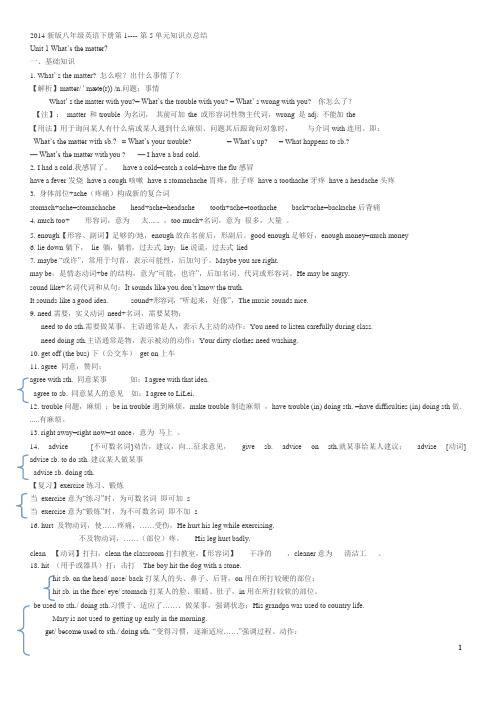
2014 新版八年级英语下册第1---- 第5 单元知识点总结Unit 1 What’s the matter?一、基础知识1.What’ s the matter? 怎么啦?出什么事情了?【解析】matter/ ' mætə(r)) /n.问题;事情What’ s the matter with you?= What’s the trouble with you? = What’ s wrong with you? 你怎么了?【注】:matter 和trouble 为名词,其前可加the 或形容词性物主代词,wrong 是adj. 不能加the【用法】用于询问某人有什么病或某人遇到什么麻烦、问题其后跟询问对象时,与介词with 连用。
即:What’s the matter with sb.? = What’s your trouble? = What’s up? = What happens to sb.?—What’s the matter with you ? — I have a bad cold.2.I had a cold.我感冒了。
have a cold=catch a cold=have the flu 感冒have a fever 发烧have a cough 咳嗽have a stomachache 胃疼,肚子疼have a toothache 牙疼have a headache 头疼3.身体部位+ache(疼痛)构成新的复合词stomach+ache=stomachache head+ache=headache tooth+ache=toothache back+ache=backache 后背痛4.much too+ 形容词,意为太...... ,too much+名词,意为很多,大量。
5.enough【形容、副词】足够的/地,enough 放在名前后,形副后。
八年级下册英语1~5单元知识点总结

八年级下册英语1~5单元知识点总结
Unit 1: Friends and Friendship
介绍自己和他人的基本信息,如姓名、年龄、国籍等。
描述人物外貌特征和性格特点。
谈论朋友和友谊的重要性。
使用形容词、副词和连词来描述人物和事件。
学习用一般现在时叙述日常活动和喜好。
Unit 2: My School Life
描述学校的位置、设施和规模。
谈论在学校里的日常活动、习惯和时间表。
学习使用一般过去时叙述过去发生的事件。
表达对学校和学习的看法和感受。
Unit 3: Look after Yourself
学习有关健康生活方式的词汇和表达方式。
讨论如何保持健康的饮食习惯和运动习惯。
提出和回答关于个人身体状况、健康问题和建议的问题。
学习一些医疗问题的词汇和表达方式。
Unit 4: Visitors from Space
学习与太空旅行和宇航员有关的常见词汇和表达方式。
谈论太空探索的历史、目的和成就。
描述太阳系的组成和行星的特点。
学习用现在进行时来描述未来计划和安排。
Unit 5: Our World
学习一些有关环境保护和全球变暖的词汇和表达方式。
讨论环境问题以及我们可以采取的行动。
描述不同地理特征和气候条件的国家和地区。
谈论旅游经历和对不同文化的了解。
新版八年级英语下册第一至第五单元知识点总结

34. As a result , he often fell ill and his grades dropped.结果,他常常生病,功课也落下了。
【解析1】as a result 结果(插入语,放在句首,用逗号隔开)Don’t ask him too late into the night, __As a result___ , he is only a small child.【解析2】fall ill 生病fall asleep 入睡35 .The earlier kids learn to be independent , the better it is for their future.孩子们越早学会独立,对他们的未来越好。
【解析】the + 比较级,the + 比较级“越...... 越...... ”The more you smile, the ___ happier____ you will feel.Unit 4 Why don’t you talk to your parents?一、基础知识1.Why don’t you talk to your parents? 你为什么不和你打父母谈谈呢?【解析】Why don't you do sth ?= Why not do sth? 为什么不......呢?【拓展】用于提建议的句型有:(1)What about doing sth ?=How about doing sth? ….怎么样?(2)Why don’t you do sth?= Why not do sth? 为什么不呢?(3)Let’s do sth.让我们一起做某事吧。
(4)Shall we/I do sth?我们做…好吗?(5)had better do/not do sth 最好做/不做某事(6) Will/Would you please do sth 请你做…好吗?(7) Would you like to do sth? 你想去做某事吗?(8)Would you mind doing sth?你介意做某事吗?【回答】(1). 同意对方的建议时,一般用:◆ Good idea./ That’s good idea. 好主意◆OK/ All right./ Great 好/ 行/太好了◆ Yes, please ./ I’d love to 是的/ 我愿意◆ I agree with you 我同意你的看法◆ No problem 没问题◆Sure/ Of course/ Certainly 当然可以◆Yes, I think so 对,我也这样想(2).对对方的帮助或要求表示委婉谢绝时,一般用:◆ I don’t think so 我认为不是这样◆Sorry, I can’t 对不起,我不能◆I’d love to, but…◆ I’m afraid…我愿意,但恐怕……2.I have to study too much so I don’t get enough sleep.我要学的太多,因此我睡眠不足。
人教版八年级下Unit1-5知识点总结
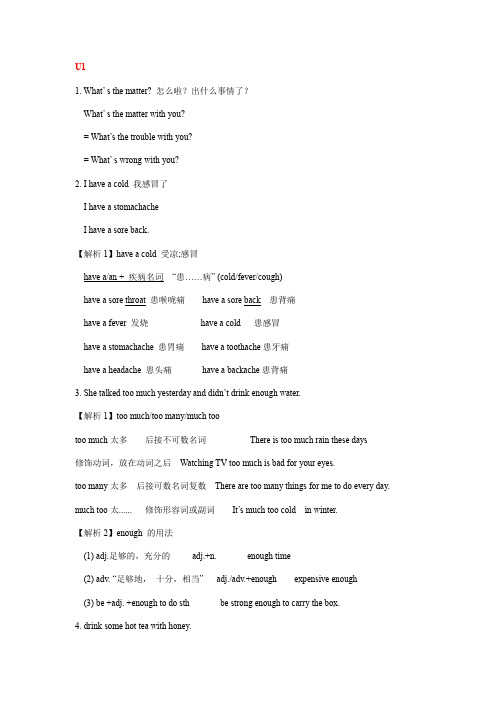
There used to be a cinema here.
I used to get up at 6:00.
6. alone【副词】独自地;单独地:
The musician lived alone.
6. No, it doesn’t sound like you have a fever.
【解析1】sound like听起来像It sounds like a good idea.
【拓展】“感官动词+ like
摸起来像____________闻起来像___________看起来像_________尝起来像___________
much too太......修饰形容词或副词It’s much too cold in winter.
【解析2】enough的用法
(1) adj.足够的,充分的adj.+n. enough time
(2) adv. “足够地,十分,相当” adj./adv.+enough expensive enough
raise【动词】举起;提高;募集
15. keep【动词】keep+名词,保留(某物);keep+形容词,保持
16.【形容词】broken破损的,出毛病的;blind瞎的,失明的;deaf聋的;disabled有残疾的,丧失能力的
在句中做定语和表语:
17. make it possible (for sb.) to do sth.使(某人)做某事成为可能,
You helped to make it possible for me to have Lucky.
人教版八年级下册英语知识点总结1—8单元

八下英语知识点Unit 1 What’s the matter?一、重点短语1. have a fever 发烧2. have a cough 咳嗽3. have a toothache 牙疼4. talk too much 说得太多5. drink enough water喝足够的水6. have a cold 受凉;感冒7. have a stomachache 胃疼8. have a sore back 背疼9. have a sore throat 喉咙痛10. lie down and rest 躺下来休息11. hot tea w ith honey 加蜂蜜的热茶12. see a dentist 看牙医13. get an X-ray 拍X 光片14. take one’ s temperature 量体温15. put some medicine on sth. 在……上面敷药16. feel very hot 感到很热17. sound like 听起来像18. all weekend 整个周末19. in the same way ? 以同样的方式20. go to a doctor 看医生21. go along 沿着……走22. on the side of the road 在马路边23. shout for help 大声呼救24. without th inking twice 没有多想25. get off 下车26. have a heart problem 有心脏病27. to one’ s surprise 使....... 惊讶的28. thanks to 多亏了;由于29. in time 及时30. save a life 挽救生命31. get into trouble 造成麻烦32. right away 立刻;马上33. because of 由于34. get out of 离开;从…出来35. hurt oneself 受伤36. put a bandage on sth. 用绷带包扎37. fa ll down 摔倒38. feel sick 感到恶心39. have a nosebleed 流鼻血40. cut his knee 割伤他的膝盖42. have problems breathing 呼吸困难43. mountain climbing 登山运动44. be used to doing sth. 习惯做某事45. run out (of) 用完;用尽46. so that 以便,为了47.so...that如此...以至于...48. be in control of 掌管;管理49. in a d iffic u lt situation 在闲境屮50. keep on doing sth. 继续或坚持做某事51. make a decision 做决定52. take risks 冒险53. give up 放弃二、重点句型1. What’ s the matter?你怎么了What’ s the matter with you?= What’s the trouble with you?= What’ s wrong with you?2. W hat should she do?她该怎么办呢?Should I take my temperature?我应该量一下体温吗?主语+ shoul d/shouldn’t + 动词原形.①You should lie down and rest.你应该躺下休息一会儿。
八年级英语下册Unit1-5知识点
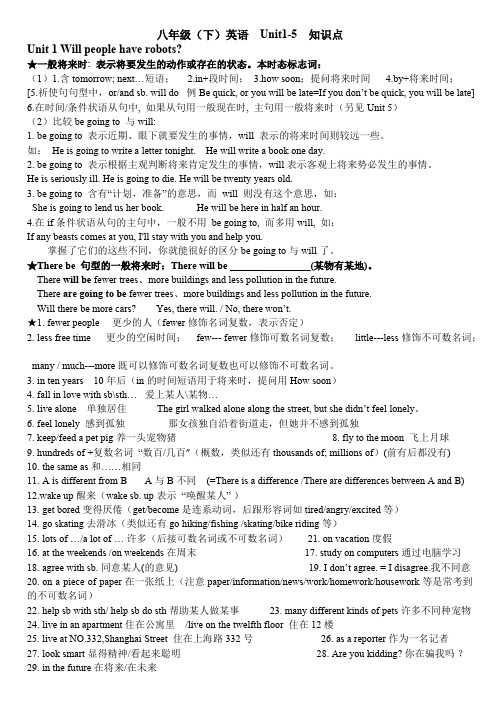
八年级(下)英语Unit1-5 知识点Unit 1 Will people have robots?★一般将来时: 表示将要发生的动作或存在的状态。
本时态标志词:(1)1.含tomorrow; next…短语; 2.in+段时间; 3.how soon;提问将来时间 4.by+将来时间;[5.祈使句句型中,or/and sb. will do 例Be quick, or you will be late=If you don’t be quick, you will be late]6.在时间/条件状语从句中, 如果从句用一般现在时, 主句用一般将来时(另见Unit 5)(2)比较be going to 与will:1. be going to 表示近期、眼下就要发生的事情,will 表示的将来时间则较远一些。
如:He is going to write a letter tonight. He will write a book one day.2. be going to 表示根据主观判断将来肯定发生的事情,will表示客观上将来势必发生的事情。
He is seriously ill. He is going to die. He will be twenty years old.3. be going to 含有“计划,准备”的意思,而will 则没有这个意思,如:She is going to lend us her book. He will be here in half an hour.4.在if条件状语从句的主句中,一般不用be going to, 而多用will, 如:If any beasts comes at you, I'll stay with you and help you. 掌握了它们的这些不同,你就能很好的区分be going to与will了。
★There be 句型的一般将来时:There will be ________________(某物有某地)。
人教版八年级英语下册1-5单元知识点归纳
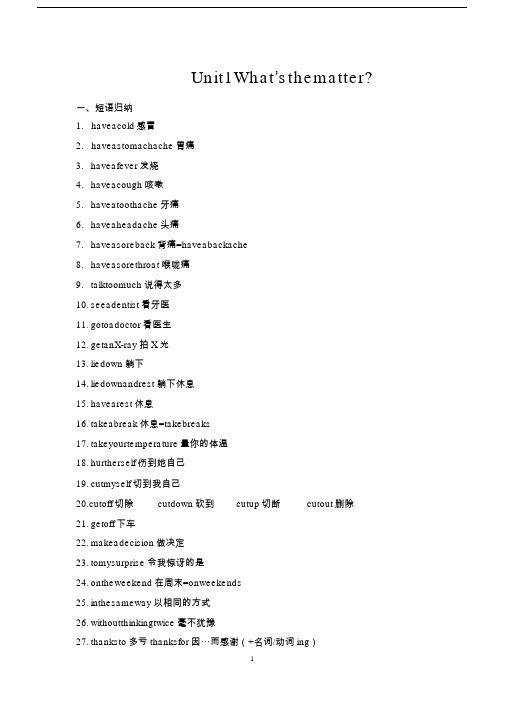
Unit1What’sthematter?一、短语归纳1.haveacold感冒2.haveastomachache胃痛3.haveafever发烧4.haveacough咳嗽5.haveatoothache牙痛6.haveaheadache头痛7.haveasoreback背痛=haveabackache8.haveasorethroat喉咙痛9.talktoomuch说得太多10.seeadentist看牙医11.gotoadoctor看医生12.getanX-ray拍X光13.liedown躺下14.liedownandrest躺下休息15.havearest休息16.takeabreak休息=takebreaks17.takeyourtemperature量你的体温18.hurtherself伤到她自己19.cutmyself切到我自己20.cutoff切除cutdown砍到cutup切断cutout删除21.getoff下车22.makeadecision做决定23.tomysurprise令我惊讶的是24.ontheweekend在周末=onweekends25.inthesameway以相同的方式26.withoutthinkingtwice毫不犹豫27.thanksto多亏thanksfor因⋯而感谢(+名词/动词ing)28.intime及时ontime按时29.savealife挽救生命30.getintotrouble陷入麻烦31.rightaway马上32.falldown跌倒33.waitfor等待34.beinterestedindoingsth.对做某事感兴趣35.giveup放弃二、用法集萃1.询问有什么病或有什么麻烦:What’sthematter(withsb.)?2.疾病的表达:have/hasa+疾病名称3.太多:toomuch+不可数名词;toomany+可数名词复数形式太:muchtoo+形容词4. enough足够的:①形容词+enough②enough+名词③itisenough+todosth.5. lie躺下过去式:lay现在分词:lying6.seesb.doingsth.看见某人正在做某事(正在进行)seesb.dosth.看见某人做了某事(看见动作的全过程)7.expecttodosth.期望做某事8.needtodosth.需要做某事9.helpsb.(to)dosth.帮助某人做某事10.tellsb.(not)todosth.告诉某人(不要)做某事11.asksb.todosth.要求某人做某事12.wanttodosth.想要做某事13.agreetodosth同.意做某事disagreetodosth.不同意做某事agreewithsb.同意某人的意见14.trouble问题;麻烦havetrouble/problemdoingsth.做某事有困难15.介词+doing常见的介词有:at;for;with;without;inabout16.be/getusedtodoingsth.习惯于做某事17.keepondoingsth.继续做某事18.minddoingtsh.介意做某事19.反身代词:myself我自己yourself你自己himself他自己herself她自己itself它自己复数:ourselves我们自己yourselves你们自己themselves他们自己20.knife-knives刀名词复数规则变化:①一般情况+s②以e结尾+s③以s、x、ch、sh结尾+es④以辅音字母+y结尾,变y为i+es⑤以o结尾,有生命+es;无生命+s⑥以f/fe结尾,变f/fe为v+es不规则变化:foot-feet脚、足tooth-teeth牙齿man-men男人woman-women女人mouse-mice老鼠21.important重要的importance重要性different不同的difference差异性22.death死亡(名词)die死(动词)dead死的(形容词)三、书面表达Howtokeephealthy如何保持健康Healthisimportant.Everyonewantstobehealthy.Letmetellyouhowtokeephealthy.Firstofall,weshouldeathealthyfood.Weshouldeatmorevegetablesandfruit.Wealson eedtodrinkmilk.Secondly,weshouldexercisealot.Weshoulddosomesportsafterschool.Finally,weshouldhaveenoughsleep.Tohaveagoodrest,weshouldgotobedearlyandgetupearly.Ithinkitisimportantforustokeephealthy.3Unit2I’llhelptocleanupthecityparks.一、短语归纳1. cleanup打扫干净cheerup使兴起来代词放中间2.giveout分发3.handout分发eupwith想出;提出(idea、plan等)5. putoff推迟puton穿衣服putup张贴putaway把⋯收好6.callup打电话;征召edtodosth.曾经做某事beusedtodingsth习.惯于做某事8. lonely孤独的(常用于feel之后)alone独自一人9.carefor照顾=takecareof10.afeelingofsatisfaction一种满足感11.tryout参加⋯选拔12.raisemoney募捐13.fixup修理14.giveaway赠送(money、oldclothes/books等)giveup放弃15.takeafter(外貌或行为)像16.besimilarto与⋯相似17.setup建立18.makeadifference影响;有作用19.disabledpeople残疾人20.makeaplan制定计划21.oldpeople’shome养老院22.helpoutwithsth.帮助解决困难23.abooklover书迷24.attheageof在⋯岁时etrue实现(与dream连用)26.atthesametime同时27.homelesspeople无家可归的人28.beworriedabout为⋯而担心worryabout担心29.forexample例如30.runoutof用完31.not⋯anymore不再32.atonce立刻;马上=rightaway二、用法集萃1.volunteertodosth自愿做某事2. difficult困难的difficulty困难havedifficulty(in)doingsth.做某事有困难3.excited兴奋的(人作主语)exciting使人兴奋的(物作主语)口诀:人+ed物+ing4.疑问词(how,what,where)+todo5. decidetodosth.决定做某事名词形式:decision makeadecision做决定6.learntodosth.学习做某事7.agoodwaytodosth.做某事的好方法8.wouldliketodosth.=wanttodosth.想要做某事9.thankyouforsth./doingsth.因某事/做某事而感谢10.kind善良的kindness善意Unit3Couldyoupleasecleanyourroom?一、短语归纳1.dothedishes清洗餐具2.takeouttherubbish倒垃圾3.foldtheclothes叠衣服foldmy/your/hisclothes4.sweepthefloor扫地5.makethebed铺床makemy/your/hisbed6.cleanthelivingroom打扫客厅7.helpoutwithsth.帮助解决某事8.atleast至少eover过来;顺便来访10.infrontof在⋯前面11.takethedogforawalk遛狗12.allthetime一直13.assoonas一⋯就⋯14.insurprise惊讶地15.hangout闲逛16.dochores做家务17.awasteoftime浪费时间18.inorderto为了19.getgoodgrades取得好成绩20.dependon依靠21.takecareof=carefor=lookafter照顾22.asaresult结果23.fallill生病二、用法集萃1.finishdoingsth.完成做某事2.if如果(主将从现,if后为从句,用一般现在时);是否(位于动词之后)3.assoonas一⋯就⋯.主将从现,assoonas后为从句4.replyangrily生气地回答(副词修饰动词,一般位于动词之后)abeautifuldog一只漂亮的狗(形容词修饰,名词,位于名词前)口诀:形名动副5.beangrywithsb.生某人的气6.as+形容词原级+as和⋯一样7.neitherdidI我也没有neither+be动词/助动词(do/does/did)/情态动词+主语“主语也不⋯..”so+be动词/助动词(do/does/did)/情态动词+主语“主语也⋯”8.can-could可以can,could还可以表示请求,could比can更有礼貌肯定回答:Sure./Ofcourse./Noproblem./Yes,sure.否定回答:No,youcan’t./Sorry,Ican’t.9.asksb.todosth.要求某人做某事10.borrow⋯from⋯跟⋯借(借进来)lend⋯to⋯把⋯借给⋯.(借出去)11.invitesb.todosth.邀请某人做某事12.helpwithsth.helpsb.(to)dotsh.帮助做某事13.havetimetodosth.有时间做某事havenotimetodosth没.时间做某事14.letsb.dosth.让某人做某事15.makesb.dosth.让某人做某事16.spend花费人+spend+时间+onsth/doingsth在某事上花时间/花时间做某事cost花费物+cost+金钱$某物花了多少钱take(took)花费Ittakes/tooksb.+时间+todo.做某事花了某人多少时间payfor付费17.itis+adj(forsb.)+todosth.做某事对某人而言是⋯的18.fair公平的unfair不公平的fairness公平性19.doone’spartindoingsth.尽自己的职责做某事20.the+比较级,the+比较级越...越⋯比较级and比较级越⋯越⋯theearlier⋯thebetter越早越好betterandbetter越来越好Unit4Whydon’tyoutalktoyourparents?一、短语归纳1.talkto/withsb.与某人交谈talkaboutsth.谈论某事2.freetime空闲时间3.allowab.todosth.允许某人做某事allowdoingsth.允许做某事4.hangout闲逛5.getintoafight争吵;打架6.sothat为了;以便于7.lookthrough浏览;快速查看8.workout成功地发展;解决9.getonwith/getalongwith和睦相处municatewithsb.与某人交谈11.abigdeal重要的事petewithsb.与某人竞争13.examskills应试技巧14.cutout删除pare⋯with⋯比较16.not..until直到⋯才17.arguewithsb.与某人争吵18.noproblem没问题19.not..anymore不再20.inmyopinion依我看21.thanksfor因⋯而感谢22.allkindsof各种各样的23.worryabout为⋯而担心=beworriedabout二、用法集萃1.提建议句型:①Youshould/shouldn’t dosth.②How/Whataboutdoingsth.?③Whydon’tyoudosth.?④Whynotdosth.?⑤Shallwedosth.?⑥Let’sdosth.⑦You’dbetterdosth.⑧Wouldyouminddoingsth.?常见回答:Goodidea./Soundsinteresting./I’dliketo./Great.否定:I’dloveto,butIhaveto⋯/Sorry,Ican’t.2.beangrywithsb.生某人的气3. although/though虽然不与but连用4.advice建议(不可数名词)5.refusetodosth.拒绝做某事6.instead代替;反而(位于句首或句尾)insteadof代替(位于句中)7.offertohelp提供帮助8.minddoingsth.介意做某事9.continuetodo/doingath.继续做某事10.keepondoingsth.继续做某事11.afew一些(肯定)few一点点(否定)修饰可数名词复数形式alittle一些(肯定)little一点点(否定)修饰不可数名词做题步骤:先看横线后的名词,判断可数还是不可数;其次,理解句子表达的肯定还是否定12.it’s timeforsth.该做某事了=it’stimetodosth.pete竞争(动词)competition竞争(名词)14.havetimetodosth有.时间做某事Unit5Whatwereyoudoingwhentherainstormcame?一、短语归纳1.gooff闹钟发出响声2.rainheavily下大雨3.pickup接电话;采摘4.atfirst起先5.fallasleep进入梦乡6.diedown逐渐变弱7.havealook看一看8.makeone’sway费力地前进9.insilence沉默10.takedown拆除;往下拽;记录11.atthetimeof⋯当⋯.的时候12.waitfor等待13.atthattime在那时(一般过去时标志词)14.wakeup醒来15.goshopping去购物16.takeashower洗澡17.inamess乱七八糟18.forexample例如19.makesure确保二、用法集萃1.过去进行时定义:表示在过去某一时刻或某一时间段正在进行的动作。
人教版八年级下册Unit1-5 (期中)知识点归纳与总结

已排版好可直接打印使用巧思妙解提升思维能力Unit1-5知识点归纳与总结Unit1Where did you go on vacation?一、重点单词复合不定代词:(anyone,anywhere,something,nothing,everyone,someone);wonder,wonderful;反身代词:(myself;yourself);few;most;bored;decide;try;difference;enough;below,umbrella二、重点短语1.go on vacation去度假2.too many太多(后跟可数名词复数)3.quite a few相当多4.study for a test为考试学习5.taste good尝起来味道好6.have a good time=have fun玩得开心7.of course当然可以8.feel like感觉像……/想要9.something important重要的事情10.because of因为(+名词,代词或名词性词)11.most of the time大多数时间12.arrive in到达13.Long time no see好久不见14.keep a diary写日记15.go to the mountains去爬山16.go to the beach到海边去17.visit the museums参观博物馆18.go to summer camp去夏令营19.go out出去20.go shopping购物21.in the past在过去22.walk around四处走走23.one bowl of rice一碗米饭24.find out查出来/发现25.go on继续26.stay at home呆在家27.take photos照相28.up and down上上下下e up升起,出来三、习惯用法、搭配1.buy sth.for sb./buy sb.sth.为某人买某物(sb.某人;sth.某物)★2.taste+adj.尝起来……(adj.形容词)3.arrive in+大地方/arrive at+小地方到达某地★4.decide to do sth.决定做某事(to do表示动词不定式,就是在动词原形前加to)★5.try doing sth.尝试做某事/try to do sth.尽力做某事6.enjoy doing sth.喜欢做某事7.want to do sth.想去做某事8.start doing sth.=start to do sth开始做某事9.stop doing sth.停止做某事10.look+adj看起来11.dislike doing sth.不喜欢做某事12.Why not do sth.?=Why don’t you do sth?为什么不做…….呢?13.so+adj+that+从句如此……以至于……★14.tell sb.(not)to do sth.告诉某人(不要)做某事15.keep doing sth.继续/不停做某事16.★16.forget to do sth.忘记去做某事/forget doing sth忘记做过某事四、重点句子--Where did you go on vacation?你到哪里去度假了?---I went to New York City.我去了纽约城--Did you go out with anyone?你和他人出去的吗?--No,No one was here.Everyone was on vacation.不,没有人在这儿。
英语八年级下册u1至u5知识点

英语八年级下册u1至u5知识点初中英语学习阶段是学习英语的重要阶段,特别是八年级下册的U1至U5单元是学习英语的基本知识点,这些知识点是英语学习的基础,掌握好这些知识点对以后的学习有很大帮助。
下面就来一一介绍这些知识点:U1 单元该单元主要介绍了各种日常活动和用语。
以下是该单元的知识点:1.动词的ing形式的使用:在现在进行时态中,我们要使用动词的ing形式来表达正在进行的动作。
如:I am reading a book.( 我正在看书)2.关于“go”的使用:go前面要带上所要前往的地方,如电影院、游泳池等,同时go后面要用动词的ing形式。
如:I'm going swimming.(我要去游泳。
)3.表达喜欢或不喜欢的用语:like和dislike是表达喜欢和不喜欢的常用用语,别忘了使用这些词时必须要用动词的ing形式。
如:I like listening to music.(我喜欢听音乐。
)U2 单元该单元主要介绍了日常生活中数字的表达方法以及时间的表达方法。
以下是该单元的知识点:1.英文数字表达:英语数字1~20之间是比较特殊的数字,记忆起来较为困难。
我们要通过一些互动游戏来记忆这些数字。
如:1(one)、2(two)、3(three)…20(twenty)2.表达时间:我们需要熟练掌握时间表达方法,在日常生活中使用时间数字的表达以及掌握am、pm的用法。
如:It's ten past nine in the morning. (早上9点10分)U3 单元该单元主要介绍了时态的使用,包括一般现在时态、一般过去时态、现在进行时态、过去进行时态、一般将来时态等。
以下是该单元的知识点:1.一般现在时态:表示现在的动作或状态,如:My father works in a hospital.(我父亲在医院工作。
)2. 一般过去时态:表示过去发生的事情,如:She watched TV yesterday evening.(昨晚她看了电视。
新人教八年级下英语1—5单元知识点总结

一. 知识点总结:(一)一般将来时一般将来时表示将来某个时间要发生的动作或者存在的状态。
通常与表示将来的时间状语连用,如tomorrow, the day after tomorrow, next year, next month, next week, in 100 years等。
be going to do (动词原形)结构:表示打算、准备做的事情或者肯定要发生的事情。
如:It is going to rain.will do 结构表示将来的用法:1. 表示预见Do you think it will rain?You will feel better after a good rest.2. 表示意图I will borrow a book from our school library tomorrow.What will she do tomorrow?基本构成如下:一般疑问句构成:(1)will+主语+do…? Will Sarah come to visit me next Sunday?(2)there be 结构的一般疑问句:Will there + be …?Will there be fewer trees? Yes, there will. / No, there won’t否定句构成:will + not (won’t)+doSarah won’t come to visit me next Sunday.特殊疑问句构成:特殊疑问词+will+主语+…?What will Sarah do next Sunday?根据例句,用will改写下列各句例:I don’t feel well today. (be better tomorrow)I’ll be better tomorrow.1. Gina has six classes today. (have a lot of homework tonight)_____________________________2. I’m tired now. (sleep later)_____________________________3. My parents need a new car. (buy one soon)_____________________________4. We can’t leave right now. (leave a little later)_____________________________5. The weather is awful today. (be better tomorrow)_____________________________答案:1. She’ll have a lot of homework tonight.2. I’ll sleep later.3. They’ll buy one soon.4. We’ll leave a little later.5. Maybe it’ll be better tomorrow.(二)should的用法:should用来提出建议和忠告,后边加动词原形,否定句直接在should后边加not.例如:I think you should eat less junk food.我认为你应该少吃垃圾食品。
人教版八年级英语下册 Unit 1-5单元词句梳理

Unit 1 What’s the matter?Period 1 Section A (1a-2d)必背单词1. matter n.问题;事情2. foot n.脚;足→ feet ( 复数)3. neck n.颈;脖子4. stomach n.胃;腹部→ stomachache n.胃痛;腹痛5. throat n.咽喉;喉咙6. fever n.发烧→ have a fever 发烧7. lie v.躺;平躺→ lay(过去式)→ lain(过去分词)→ lying(现在分词)8. rest v.& n.放松→ take/have a rest 休息一下9. cough n.&v.咳嗽→ have a cough 咳嗽10. X-ray n. X 射线;X 光→ take an X-ray 拍X 光片11. toothache n.牙痛→ tooth n.牙齿12. headache n.头痛→ have a headache 头痛13. break n.间歇;休息14. hurt v.(使)疼痛;受伤→hurt(过去式、过去分词)必背短语15. have a cold/stomachache 感冒/ 胃痛16. lie down 躺下17. take one’s temperature 量体温18. take breaks=take a break 休息必背句子19. Yeah, I think I sat in the same way for too long without moving.是啊,我想我保持同样的坐姿太久了而没动。
20. If your head and neck still hurt tomorrow, then go to a doctor.如果明天你的头和脖子还疼的话,就去看医生吧。
Period 2 Section A (3a-3c)必背单词1. passenger n.乘客2. off adv.& prep.离开(某处);不工作;从……去掉→ have a day off 休假一天3. onto prep.向;朝4. trouble n.问题;苦恼→ have trouble (in) doing sth. 做某事有困难5. hit v.(用手或器具)击;打→ hit(过去式)必背短语6. think twice 认真思考,权衡利弊7. get off 下车→ get on 上车8. wait for 等待;等候9. to one’s surprise 使……惊讶的是;出乎……的意料10. thanks to 多亏;由于→ thanks for 因……而感谢11. in time 及时→ on time 准时12. right away=at once 立即;马上13. agree to do sth. 同意做某事→ agree with sb. 同意某人(的意见或观点等)14. get into 陷入;参与必背句子15. She said that the man had a heart problem and should go to the hospital.她说这位老人有心脏病,应该去医院。
- 1、下载文档前请自行甄别文档内容的完整性,平台不提供额外的编辑、内容补充、找答案等附加服务。
- 2、"仅部分预览"的文档,不可在线预览部分如存在完整性等问题,可反馈申请退款(可完整预览的文档不适用该条件!)。
- 3、如文档侵犯您的权益,请联系客服反馈,我们会尽快为您处理(人工客服工作时间:9:00-18:30)。
(三)
过去进行时
过去进行时表示过去某一点时间正在进行的动作或者过去某一段时间内一直进行的动 作。
1. 构成
was /were + doing ,例如: I was watching TV at 9 o ’ clock last n.ight at 9 o ’ clocskt lnaight 是时间点
’t
Sarah won ’ t come to visit me next Sunday. 特殊疑问句构成:
ห้องสมุดไป่ตู้
特殊疑问词+ will +主语+ , ? What will Sarah do next Sunday? 根据例句,用 will 改写下列各句
例: I don ’ t feel well today(. be better tomorrow )
I ’ ll be better tomorrow. 1. Gina has six classes today. ( have a lot of homework tonight )
_____________________________ 2. I ’ m tired now(. sleep later)
一. 知识点总结: (一)
一般将来时
一般将来时表示将来某个时间要发生的动作或者存在的状态。
通常与表示将来的时间状
语连用, 如 tomorrow, the day after tomorrow, next year, next month, next week, in 100 years 等。
be going to do (动词原形)结构:表示打算、准备做的事情或者肯定要发生的事情。 如: It is going to rain.
will do 结构表示将来的用法: 1. 表示预见
Do you think it will rain?
You will feel better after a good rest. 2. 表示意图
I will borrow a book from our school library tomorrow.
What will she do tomorrow? 基本构成如下: 一般疑问句构成:
( 1) will+ 主语 +do , ? Will Sarah come to visit me next Sunday?
( 2) there be 结构的一般疑问句: Will there + be , ? Will there be fewer trees? Yes, there will. / No, there won 否定句构成: will + not ( won’)t+do
They were playing football all afternoon. all afternoon 是时间段 2. 过去进行时的标志词 at 8 o ’ clock last night, this time yesterd等ay。例如:
2. I ’ ll sleep later.
3. They ’ ll buy one soon. 4. We ’ ll leave a little later.
5. Maybe it ’ ll be better tomorrow.
(二) should 的用法: should 用来提出建议和忠告,后边加动词原形,否定句直接在
_____________________________ 5. The weather is awful today. ( be better tomorrow )
_____________________________ 答案: 1. She ’ll have a lot of homework tonight.
_____________________________
3. My parents need a new car. ( buy one soon)
_____________________________ 4. We can ’ t leave right now(. leave a little later )
should 后边加 not.
例如: I think you should eat less junk food. 我认为你应该少吃垃圾食品。 She drives a lot and she seldom walks. So I think she should walk a lot. 她经常开车,很少走路。所以我认为她应该多走路。 Students shouldn ’ t spend too much time playing computer games. 学生们不应当花太多的时间玩计算机游戏。 学习向别人提建议的几种句式: ( 1) I think you should , ( 2)Well, you could , ( 3) Maybe you should , ( 4)Why don ’ t yo,u ? ( 5)What about doing sth.? ( 6)You’ d better do sth. 用 should 或 shouldn ’填t空 1. I can ’ t sleep the night before exams. You ______ take a warm shower before you go to bed. 2. Good friends ______ argue each other. 3. There is little milk in the glass. We _______ buy some. 4. They didn ’ t invite you? Maybe you ______ be friendlier. 5. I am a little bit overweight. So I think I _______ do exercises every day. 答案: 1. should 2. shouldn ’t3. should 4. should 5. should
